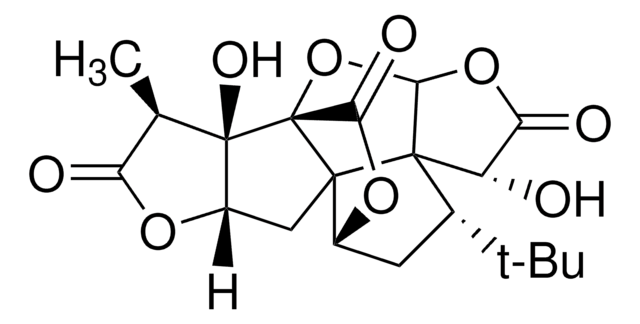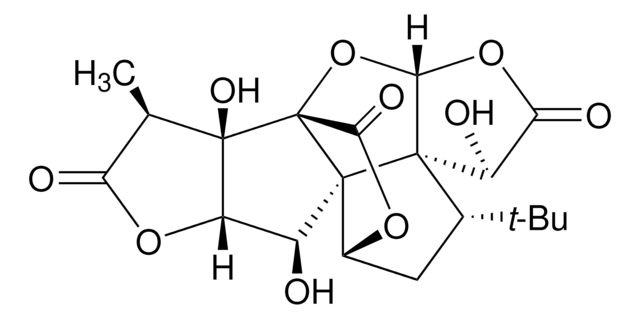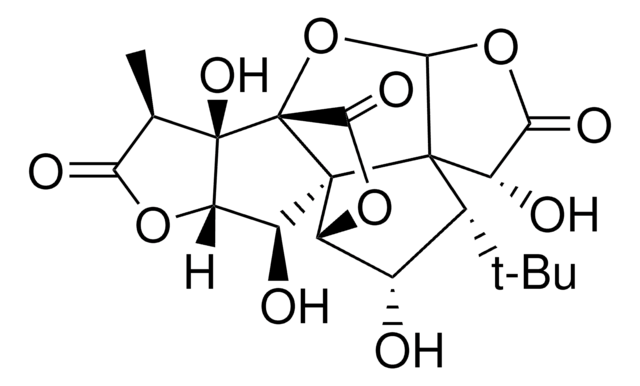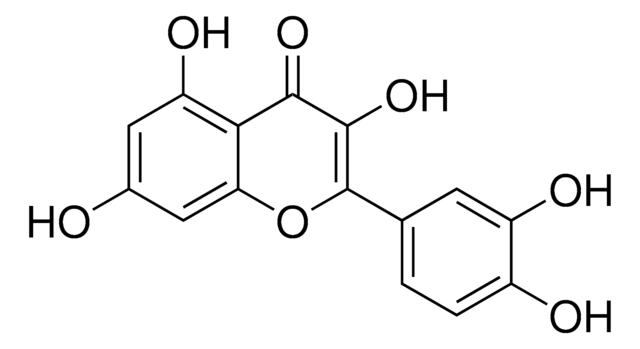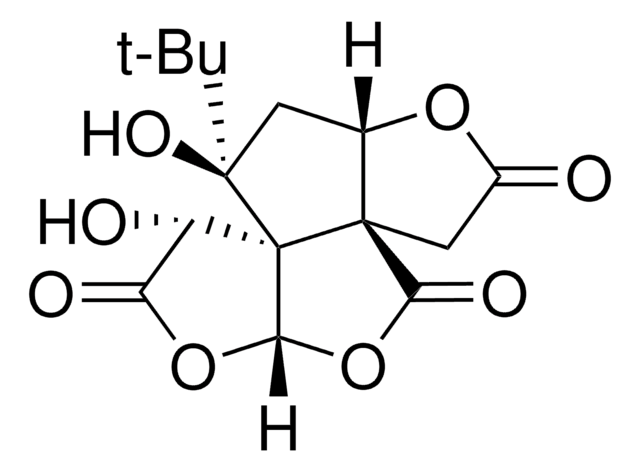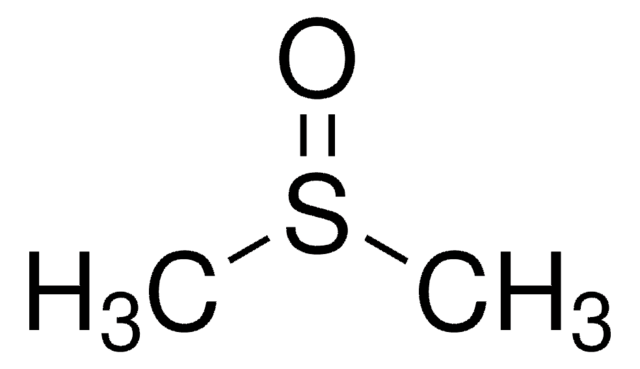모든 사진(4)
About This Item
실험식(Hill 표기법):
C15H18O8
CAS Number:
Molecular Weight:
326.30
MDL number:
UNSPSC 코드:
85151701
PubChem Substance ID:
NACRES:
NA.28
추천 제품
생물학적 소스
plant leaves (Ginkgo biloba)
Quality Level
분석
≥93% (HPLC)
양식
powder
기술
HPLC: suitable
색상
white
저장 온도
−20°C
SMILES string
CC(C)(C)[C@]1(O)CC2OC(=O)C[C@@]23C(=O)OC4OC(=O)[C@H](O)[C@]134
InChI
1S/C15H18O8/c1-12(2,3)14(20)4-6-13(5-7(16)21-6)10(19)23-11-15(13,14)8(17)9(18)22-11/h6,8,11,17,20H,4-5H2,1-3H3/t6-,8-,11-,13-,14+,15+/m0/s1
InChI key
MOLPUWBMSBJXER-YDGSQGCISA-N
일반 설명
Bilobalide is a biologically active terpenic trilactone (terpenoid) extracted from Ginkgo biloba. It is synthesized from geranylgeranyl pyrophosphate (GGPP).
애플리케이션
(-)-Bilobalide from Ginkgo biloba leaves has been used as a reference substance to study the antimicrobial activity of different fractions of G.biloba leaves against a number of Gram-positive and negative bacteria and yeasts.
생화학적/생리학적 작용
Bilobalide is an inducer of cytochrome P450 enzymes CYP3A1 and CYP1A2. It exhibits neuroprotective, anti-inflammatory, anti-oxidative and anti-apoptotic properties. Bilobalide, a γ-aminobutyric acid (GABA) AA-rho, 5-hydroxytryptamine type 3 (5-HT(3)) receptor antagonist, may be used to study the function of these receptors in the brain processes such as cognition and memory. It serves as a specific platelet-activating factor receptor antagonist, which helps in the treatment of cardiovascular (Alzheimer′s disease) and cerebrovascular diseases.
Bioactive terpenoid found in Ginkgo biloba.
Storage Class Code
11 - Combustible Solids
WGK
WGK 3
Flash Point (°F)
Not applicable
Flash Point (°C)
Not applicable
개인 보호 장비
Eyeshields, Gloves, type N95 (US)
이미 열람한 고객
Induction of cytochrome P450 3A by the Ginkgo biloba extract and bilobalides in human and rat primary hepatocytes
Zhou SF, et al.
Drug Metabolism Letters, 2(1), 60-66 (2008)
Antimicrobial investigation of semipurified fractions of Ginkgo biloba leaves
Mazzanti G, et al.
Journal of Ethnopharmacology, 71(1-2), 83-88 (2000)
Protective and therapeutic role of Bilobalide in cuprizone-induced demyelination
Sui RX, et al.
International Immunopharmacology, 66, 69-81 (2019)
Molecular cloning, characterization, and functional analysis of acetyl-CoA C-acetyltransferase and mevalonate kinase genes involved in terpene trilactone biosynthesis from Ginkgo biloba
Chen Q, et al.
Molecules (Basel), 22(1), 74-74 (2017)
Flaubert Tchantchou et al.
Journal of Alzheimer's disease : JAD, 18(4), 787-798 (2009-08-08)
Loss of synapses has been correlated with dementia in Alzheimer's disease (AD) as an early event during the disease progression. Hence, synaptogenesis and neurogenesis in adulthood could serve as a therapeutic target for the prevention and treatment of AD. Recently
자사의 과학자팀은 생명 과학, 재료 과학, 화학 합성, 크로마토그래피, 분석 및 기타 많은 영역을 포함한 모든 과학 분야에 경험이 있습니다..
고객지원팀으로 연락바랍니다.